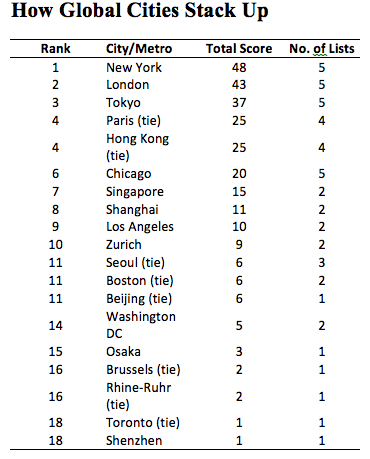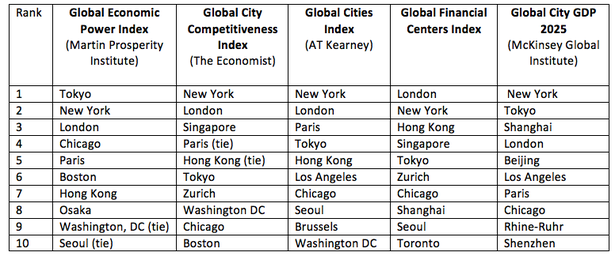What Is the World's Most Economically Powerful City?
To kick off The Atlantic's new special report on the past and future of the world's global capitals, we ask: What city rules them all?
To kick off The Atlantic's new special report on the past and future of the world's global capitals, we begin with a survey of the surveys to answer that universal question: What city rules them all?
Cities matter.
Just the world's top 100 metros generate roughly half of the globe's total economic output, according my own Martin Prosperity Institute estimates. The top twenty produce nearly 30 percent and the top ten accounts for more than a fifth of global economic production. More than 80 percent of U.S. economic output comes from its cities and metros areas, compared to roughly two-thirds in Europe. Even in China, which has urbanized much more recently and where many remain in rural areas, 78 percent of GDP comes from cities and metros, according to recent estimates from the McKinsey Global Institute.
But in contest for one metro to rule them all, New York takes the crown as the most economically powerful metropolitan, according to my assessment of five recent comprehensive rankings of global cities. London is second, followed by Tokyo and Chicago. The former tops the ranks of the most economically powerful cities in Asia, though Seoul, Hong Kong, Singapore and Shanghai also rank highly. Paris, LA, DC and Boston also show strength.
The most common way to rank cities is by their populations. It's well known than more than half the world's population now lives in cities and metro areas. In another couple of decades that will increase to roughly three quarters. But population is a crude measure of economic strength, which is more a function of productivity, technology and human capital or skills.
The biggest issue in gauging the economic power of cities until recently has been the lack of good, comparable and systematic data. But in the past several years, a number of research teams, think tanks and global consulting firms have come up with novel and innovative ways to gauge the relative economic strengths of global cities and metro areas. The table below summarizes the top ten rankings on five of these new metrics.
From left to right, my own Global Economic Power Index reflects three key dimensions of economic power: economic (economic output), innovation (patents) and financial. The Economist's Global City Competitiveness Index incorporates 31 indicators of economic strength, human capital, institutional effectiveness, financial maturity, global appeal, physical capital, social and cultural character and environment and natural hazards. AT Kearney's Global Cities Index gauges business activity, human capital, information exchange, cultural experience, and political engagement. The Global Financial Centres Index measures financial and banking strengths, and the McKinsey Global Institute projects global city economic output up to 2025. The second table (below) shows my scoring of these global cities across the five lists. (Note: A city's total score reflects its rank across the five lists above, where 10 points is awarded to a first place, 9 to a second place rank and so on.)

Hong Kong and Paris tie for fourth, followed by Chicago, Singapore, Shanghai, LA, and Zurich round out the top ten. While China is projected to eclipse the United States as the world's largest economy by as early as 2016 according to some predictions, it will be some time before Asian cities overtake New York. New York remains in the top spot according to McKinsey's 2025 projections.
There are several reasons to believe New York's position atop the global urban hierarchy is secure, at least for the medium-run. For one, it is the world's most open and diverse large city. As its mayor Michael Bloomberg recently noted in the Financial Times, the key to global competitiveness lies in a city's ability to attract the best and brightest from every corner of the globe. "The most creative individuals want to live in places that protect personal freedoms, prize diversity and offer an abundance of cultural opportunities," he wrote.
With the possible exception of Hong Kong, Asia's cities still lack this level of openness and attractiveness. And they face considerable competition with each other for regional, never mind, global dominance. History shows leading global cities to have incredible resilience and an ability to fend off competition, which takes a much greater toll on second and third tier cities. Giant economic centers can retain their clout long after their nations decline, as Youseff Cassis' landmark, Capitals of Capital shows: London, which held its status as the world's leading city for decades after the decline of the English empire is perhaps the best case in point.

